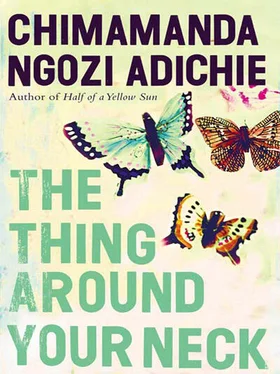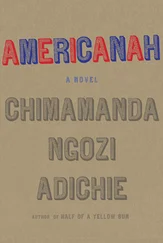A few months later, Mgbeke visited, smiling, bringing a covered bowl of one of those concoctions that Nwamgba found inedible, and Nwamgba knew that her chi was still wide awake and that her daughter-in-law was pregnant. Anikwenwa had decreed that Mgbeke would have the baby at the mission in Onicha, but the gods had different plans and she went into early labor on a rainy afternoon; somebody ran in the drenching rain to Nwamgba’s hut to call her. It was a boy. Father O’Donnell baptized him Peter, but Nwamgba called him Nnamdi, because she believed he was Obierika come back. She sang to him, and when he cried she pushed her dried-up nipple into his mouth, but try as she might, she did not feel the spirit of her magnificent husband Obierika. Mgbeke had three more miscarriages and Nwamgba went to the oracle many times until a pregnancy stayed and the second baby was born, this time at the mission in Onicha. A girl. From the moment Nwamgba held her, the baby’s bright eyes delightfully focused on her, she knew that it was the spirit of Obierika that had returned; odd, to have come in a girl, but who could predict the ways of the ancestors? Father O’Donnell baptized her Grace, but Nwamgba called her Afamefuna, “My Name Will Not Be Lost,” and was thrilled by the child’s solemn interest in her poetry and her stories, the teenager’s keen watchfulness as Nwamgba struggled to make pottery with newly shaky hands. But Nwamgba was not thrilled that Afamefuna was to go away to secondary school (Peter was already living with the priests in Onicha), because she feared that, at boarding school, the new ways would dissolve her granddaughter’s fighting spirit and replace it either with an incurious rigidity, like Anikwenwa’s, or a limp helplessness, like Mgbeke’s.
The year that Afamefuna left for secondary school in Onicha, Nwamgba felt as if a lamp had been blown out on a moonless night. It was a strange year, the year that darkness suddenly descended on the land in the middle of the afternoon, and when Nwamgba felt the deep-seated ache in her joints, she knew her end was near. She lay on her bed gasping for breath, while Anikwenwa pleaded with her to be baptized and anointed so that he could hold a Christian funeral for her, as he could not participate in a heathen ceremony. Nwamgba told him that if he dared to bring anybody to rub some filthy oil on her, she would slap that person with her last strength. All she wanted was to see Afamefuna before she joined the ancestors, but Anikwenwa said that Grace was taking exams in school and could not come home. But she came. Nwamgba heard the squeaky swing of her door and there was Afamefuna, her granddaughter who had come on her own from Onicha because she had been unable to sleep for days, her restless spirit urging her home. Grace put down her schoolbag, inside of which was her textbook with a chapter called “The Pacification of the Primitive Tribes of Southern Nigeria,” by an administrator from Worcestershire who had lived among them for seven years.
It was Grace who would read about these savages, titillated by their curious and meaningless customs, not connecting them to herself until her teacher, Sister Maureen, told her she could not refer to the call-and-response her grandmother had taught her as poetry because primitive tribes did not have poetry. It was Grace who would laugh loudly until Sister Maureen took her to detention and then summoned her father, who slapped Grace in front of the teachers to show them how well he disciplined his children. It was Grace who would nurse a deep scorn for her father for years, spending holidays working as a maid in Onicha so as to avoid the sanctimonies, the dour certainties, of her parents and brother. It was Grace who, after graduating from secondary school, would teach elementary school in Agueke, where people told stories of the destruction of their village years before by the white men’s guns, stories she was not sure she believed, because they also told stories of mermaids appearing from the River Niger holding wads of crisp cash. It was Grace who, as one of the few women at the University College in Ibadan in 1950, would change her degree from chemistry to history after she heard, while drinking tea at the home of a friend, the story of Mr. Gboyega. The eminent Mr. Gboyega, a chocolate-skinned Nigerian, educated in London, distinguished expert on the history of the British Empire, had resigned in disgust when the West African Examinations Council began talking of adding African history to the curriculum, because he was appalled that African history would even be considered a subject. Grace would ponder this story for a long time, with great sadness, and it would cause her to make a clear link between education and dignity, between the hard, obvious things that are printed in books and the soft, subtle things that lodge themselves into the soul. It was Grace who would begin to rethink her own schooling — how lustily she had sung, on Empire Day, “God bless our Gracious King. Send him victorious, happy and glorious. Long to reign over us”; how she had puzzled over words like “wallpaper” and “dandelions” in her textbooks, unable to picture those things; how she had struggled with arithmetic problems that had to do with mixtures, because what was coffee and what was chicory and why did they have to be mixed? It was Grace who would begin to rethink her father’s schooling and then hurry home to see him, his eyes watery with age, telling him she had not received all the letters she had ignored, saying amen when he prayed, pressing her lips against his forehead. It was Grace who, driving past Agueke on her way back, would become haunted by the image of a destroyed village and would go to London and to Paris and to Onicha, sifting through moldy files in archives, reimagining the lives and smells of her grandmother’s world, for the book she would write called Pacifying with Bullets: A Reclaimed History of Southern Nigeria . It was Grace who, in a conversation about the early manuscript with her fiancé, George Chikadibia — stylish graduate of Kings College, Lagos; engineer-to-be; wearer of three-piece suits; expert ballroom dancer who often said that a grammar school without Latin was like a cup of tea without sugar — knew that the marriage would not last when George told her she was misguided to write about primitive culture instead of a worthwhile topic like African Alliances in the American-Soviet Tension. They would divorce in 1972, not because of the four miscarriages Grace had suffered but because she woke up sweating one night and realized that she would strangle him to death if she had to listen to one more rapturous monologue about his Cambridge days. It was Grace who, as she received faculty prizes, as she spoke to solemn-faced people at conferences about the Ijaw and Ibibio and Igbo and Efik peoples of Southern Nigeria, as she wrote reports for international organizations about commonsense things for which she nevertheless received generous pay, would imagine her grandmother looking on and chuckling with great amusement. It was Grace who, feeling an odd rootlessness in the later years of her life, surrounded by her awards, her friends, her garden of peerless roses, would go to the courthouse in Lagos and officially change her first name from Grace to Afamefuna.
But on that day as she sat at her grandmother’s bedside in the fading evening light, Grace was not contemplating her future. She simply held her grandmother’s hand, the palm thickened from years of making pottery.
Thank you to Sarah Chalfant, Robin Desser, and Mitzi Angel.
The following stories have been previously published: “Jumping Monkey Hill” in Granta 95: Loved Ones; “On Monday of Last Week” in Granta 98: The Deep End; “The Arrangers of Marriage” as “New Husband” in Iowa Review; “Cell One” and “The Headstrong Historian” in The New Yorker; “Imitation” in Other Voices; “The American Embassy” in Prism Inter national; “The Thing Around Your Neck” in Prospect 99; “Tomorrow Is Too Far” in Prospect 118; “A Private Experience” in Virginia Quarterly Review; and “Ghosts” in Zoetrope: All-Story . “The American Embassy” also appeared in The O. Henry Prize Stories 2003 , edited by Laura Furman (Anchor Books, 2003).











